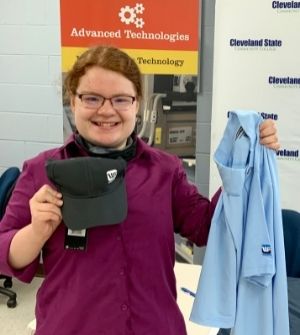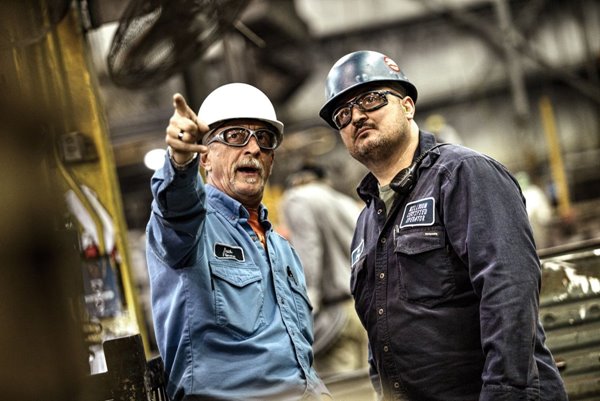Thinking Different in Education for Tomorrow’s Jobs
Ally Melby | Waupaca Foundry.jpg)
Holly Farrow at the Cleveland State Community College Signing Day.
Students Rethink the Next Step in Education
There has long been a stigma of choosing to attend a trade school over a four-year college. But as the price of tuition for universities has soared, the demand for workers has become more precedent, and the want of students to obtain a degree that is more niche to their future employment opportunities has increased, the value of trade schools in today’s economy is invaluable.
Holly Farrow, general foundry maintenance at Waupaca Foundry’s ductile iron foundry in Etowah, Tennessee, is one of the many who chose to think differently when it came to her education. Farrow faced hardships in high school, choosing the untraditional route of receiving her GED in 2018. Passionate about technology, Farrow then attended Cleveland State Community College to study mechatronics technology and applied for the Advanced Technologies Institute (ATI). Designed for students majoring in Advanced Technology programs, the ATI program allows select students to learn in the classroom and simultaneously apply their education to real-world job experience with local companies. Students attend classes two days per week and then work in their field of study the other 3 days of the week – while earning a competitive wage to offset the costs of tuition, books, room and board, and additional expenses.
“When you get your first job, you don't have a year of experience, and usually most companies want people to have some work experience, so it's a catch-22. I need to get the experience, but if nobody is going to hire me, how will I get that experience? With the ATI program, they take in interns with little to no experience and train students for the manufacturing world,” Farrow says.
In the fall of 2020, Farrow was entering her last year of college and needed an internship before graduation. This also marked the first semester students were returning to classrooms since the COVID-19 pandemic began, and there were many unknowns regarding business operations and companies’ ability to offer internships and work experience. Recognizing a need for skilled labor in the market, Waupaca Foundry joined the ATI program as a partnering manufacturer at the same time.
For young adults, like Farrow, choosing to balance their studies with a job is no easy feat. According to the National Center for Education Statistics, in 2018, only 43 percent of full-time undergraduate students were employed. However, with the right attitude, Waupaca Foundry has witnessed the success of its students.
Reflecting on the interview process, “Holly was like, ‘Hey, I just want to be able to take care of myself, be a productive person in society, have a home’ and she was very sincere and adamant that [she’ll] do whatever it takes to find the niche in the world that [she] can do. That dedication just really struck a chord with me,” says Eric Zaharias, maintenance manager in Etowah, Tennessee, and a supervisor of the program. “It’s so refreshing to start a program and have someone like Holly kick it off. It’s changed everyone’s attitude when you talk about mentoring, and you have someone like Holly participate. It opened up a lot of doors to do this again.”
Farrow spent the year learning from Waupaca Foundry maintenance members and electricians, underwent safety training, and studied specialized tasks in the core room to become certified in working with the robots.
“For me, [Waupaca Foundry] helped reinforce what I learned in the classroom and taught me a few new skills that were specifically in the mechatronics program,” Farrow says.
The success of Holly’s internship was also echoed in her studies at Cleveland State Community College.
“Holly is, and will continue to be throughout the coming years, someone who can be used as a model for not only local manufacturers, but also students in our programs here at CSCC. Her grit, resilience, and drive is one to be acknowledged and celebrated. Her work ethic and soft skills have not only been internally learned and grown, but here at CSCC, we continually and intentionally work to increase these strengths throughout the ATI program as a key piece of the initiatives and goals” Marci R. Reiter, M.A., first year experiences coordinator & associate professor advanced technologies institute consultant, says.
In her last semester of the ATI program, Farrow was offered a full-time job at Waupaca Foundry and accepted.
“I've been really grateful for my opportunity at Waupaca, and I look forward to serving them to the best of my capabilities and continuing to learn and grow, and just stay humble and appreciative … If I could go back in the past to tell my younger self, where I'm at now, I don't think I would believe my future self,” Farrow says.


We use cookies and other tracking technologies to personalize content and analyze our site traffic. More information about this is in our Privacy Policy. You can control third party cookies by adjusting your browser settings.